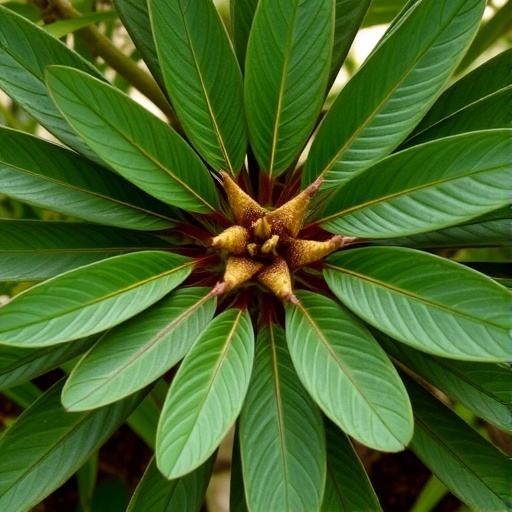As the ripple effects of climate change increasingly reverberate through global ecosystems, one highly significant study has emerged from the Southern Brazilian Amazon, focusing on the critical commodity known as Brazil nut, scientifically named Bertholletia excelsa. This research, conducted by a prominent team led by Gervazio et al., serves as a clarion call for the necessity of understanding and addressing the vulnerabilities of extractivism in the face of rising environmental threats. The research underscores how shifting climatic conditions are poised to jeopardize the resilience of Bertholletia excelsa extractivism, a practice that is not only economically vital but also crucial for local biodiversity and cultural practices.
Located deep within one of the world’s most biodiverse regions, the Brazil nut tree thrives in a delicate balance of humidity, temperature, and soil conditions that are increasingly being disrupted by climate change. Over decades, the Amazon has imparted life and sustenance to a multitude of species, but the health of this ecosystem is now in peril. As temperatures rise and rainfall patterns shift, the fundamental ecological balance required for the thriving of Bertholletia excelsa is unraveling. The implications for local communities that depend on this extractivism extend far beyond mere economic interests; they touch upon the very sustainability of their livelihoods and cultural identity.
In the regions where Brazil nuts are harvested, local communities have developed intricate knowledge systems that highlight their reliance on the natural rhythms of the ecosystem. This localized understanding fosters a sustainable approach to extraction, where the harvests are timed to maximize yield while maintaining ecological balance. However, as climate change alters seasonal weather patterns, the synchronization between the trees and these traditional practices can be thrown into disarray. This dissonance not only threatens tree health and productivity but also challenges the cultural transmission of knowledge that has been passed down through generations.
The study employs a multifaceted approach, combining ecological research with socio-economic analysis to paint a comprehensive picture of the risks posed by climate change. Researchers collected data from various sites across the Amazon basin, measuring environmental variables and assessing their impact on Brazil nut yield and quality. Crucially, these findings reveal that fluctuating temperatures can reduce the reproductive success of these ancient trees, resulting in potential decreases in nut production. This change threatens the economic foundation upon which many local communities depend, raising concerns about food security and economic stability in the region.
Moreover, the paper brings into focus the interconnected nature of ecosystem services and human well-being. The Brazil nut industry is not only a source of income but plays a pivotal role in maintaining the ecological integrity of the Amazon rainforest. The extractivism of Brazil nuts promotes forest conservation, as the trees themselves contribute to carbon sequestration and provide habitat for countless species. Disruption of this practice due to climate change threatens to weaken these beneficial ecological services, potentially leading to broader environmental degradation.
In acknowledging the urgency of the situation, Gervazio and colleagues emphasize the need for adaptive management strategies that can help bolster the resilience of both the Brazil nut tree and the communities that rely on it. These strategies could include the development of climate-resilient cultivation techniques, improved forest management practices, and bolstering local capacities to monitor and respond to changing environmental conditions. The authors advocate for a collaborative approach that engages various stakeholders, including local communities, researchers, governmental agencies, and environmental organizations, to build a collective response to the challenges posed by climate change.
The findings of this research might also serve as a cautionary tale, illustrating the delicate balance between human activity and natural systems. As we rapidly march towards an uncertain future shaped by climate change, the lessons learned from Bertholletia excelsa extractivism could offer vital insights into how societies adapt to shifting ecological realities. The very survival of this industry may depend on the ability of communities and policymakers to navigate these uncertainties with wisdom and foresight.
In conclusion, the study authored by Gervazio et al. stands as a critical examination of the multifaceted interactions between climate change and indigenous extractivism. By shedding light on the vulnerabilities faced by Bertholletia excelsa, this research paves the way for deeper understanding and concerted action to safeguard both the economic and ecological viability of Brazil nuts in the Southern Brazilian Amazon. As we contend with the escalating challenges of climate change, the resilience of this iconic tree and the communities it supports hangs in the balance, demanding our attention and proactive engagement.
This important study serves as more than just an academic exercise; it is a rallying cry for action, a reminder of our interconnected existence within the natural world, and a testament to the urgent need for concerted efforts in the face of climate change. The future of Brazil nut extractivism hinges on our ability to adaptively manage and conserve these precious resources, ensuring that both people and nature can thrive together in harmony amid changing conditions.
Subject of Research: Impact of climate change on Brazil nut extractivism in the Southern Brazilian Amazon.
Article Title: Climate change threatens the resilience of Bertholletia excelsa extractivism in the Southern Brazilian Amazon.
Article References:
Gervazio, W., Arguelho, J.S., Cupertino-Eisenlohr, M.A. et al. Climate change threatens the resilience of Bertholletia excelsa extractivism in the Southern Brazilian Amazon. Discov. For. 1, 51 (2025). https://doi.org/10.1007/s44415-025-00052-x
Image Credits: AI Generated
DOI: https://doi.org/10.1007/s44415-025-00052-x
Keywords: climate change, Brazil nuts, Bertholletia excelsa, Amazon, extractivism, biodiversity, local communities, ecological balance, sustainability, adaptation strategies.




